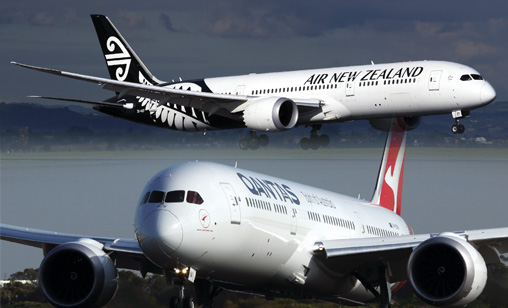Addendum
Air New Zealand and Qantas remain top of the profit charts
September 1st 2018
For the fiscal year to June 30, 2018, Air New Zealand (Air NZ) and the Qantas Group reported impressive results. Read More » Air NZ announced net earnings of US$220 million for the year, the airline’s second best results in its history.
In Sydney, the Qantas Group reported an after tax profit of US$685.5 million on an underlying profit of US$1.2 billion. Both carriers shrugged off rising fuel costs and intense competition to report record results.
 |
In Auckland in June, Air NZ CEO, Christopher Luxon, said in a local media interview that the past 12 months had been his toughest year since he took on the job of running the carrier more than six years ago.
In the reported 12 months, the airline had to deal with a week-long rupture in the fuel line that supplied its airliners at its Auckland hub. Fuel had to be shipped from off shore and all staff endured huge customer pressure to maintain flight services. The airline is suing Z Energy and BP to recover losses of more than US$3 million from the fuel delivery breakdown.
Later in the year, corrosion on Trent 1000 engine blades that powered the airline’s B787s were sufficiently numerous for the carrier to lease extra aircraft as well as train crews to fulfill customer bookings during its peak travel season. Several severe weather incidents also forced the carrier to cancel flights, an unavoidable situation that not every customer understood.
Ahead for the carrier are new routes from Auckland to Taipei and Chicago, the addition of new A320 family aircraft and three B787s to its fleet and management of rising fuel prices.
At Qantas, group CEO, Alan Joyce, said all the Jetstar brands in Asia were performing well despite intense competition from full service and low-cost rivals. They continued to give the group “a capital light foothold” in key growth markets”, he said.
“The expansion of the Qantas hub in Singapore has been helped by traffic flows and onward connections with these airlines.”
Strength in forward bookings and its continuing transformation program gave the Group confidence it could substantially cover higher fuel costs in the current fiscal year. The fuel bill in the current year is calculated at $2.87 billion, an increase of $504.4 million over the previous 12 months, Joyce said.
Higher fuel costs would be offset by savings from the Group’s transformation program of $295.3 million. “We are facing another increase in our fuel bill for fiscal year 2018-2019. We are confident we will substantially recover this expenditure from capacity, revenue and cost efficiency measures as well as our hedging program,” he said.